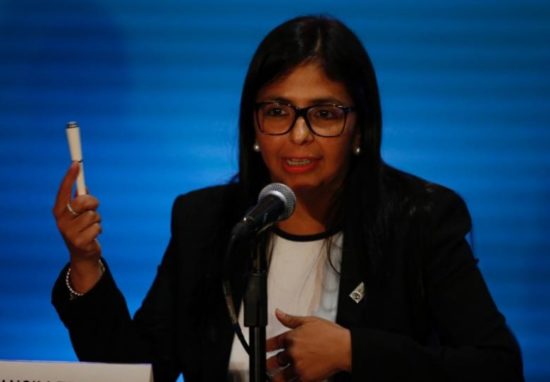The Associated Press reported the Organization of American States meeting being held in Cancun once again narrowly failed to approve a resolution that would have pushed back against some of Venezuelan President Nicolas Maduro’s most radical actions.
“What can we say to the sick, who can’t find medicines?” Mexican Foreign Minister Luis Videgaray said of the setback, referring to the medicine shortages that Venezuelans are experiencing.

Venezuelan Foreign Minister Delcy Rodriguez addresses the media at the OAS 47th General Assembly in Cancun. PHOTO: REUTERS/Carlos Jasso
As the meeting took place, thousands of protesters took to the streets of the Venezuelan capital, Caracas, to protest against Maduro’s government. Protesters chanted “Who are we? Venezuela! What do we want? Freedom!”
Amid the clashes on Caracas’ main highway, 17-year-old Fabian Urbina was killed as the result of a bullet wound to the chest. Several others were also shot.
In a rare rebuke of security forces that Maduro has been relying on to crush the protests, Interior Minister Nestor Reverol blamed excessive force by national guardsmen for the shootings, saying that troops who fired into the crowd would be held accountable.
The reproach came after cell phone videos circulated on social media showing the national guardsmen firing into a crowd in brazen violation of rules against using firearms to control protests.
Several diplomats made reference to the growing violence on the streets in Caracas. But it wasn’t enough to persuade enough countries, especially from the Caribbean nations that have long relied on cheap oil shipments from Venezuela, to take a tougher stance against Maduro.
Venezuelan Foreign Minister Delcy Rodriguez stormed out of the meeting, and claimed that more OAS members who she didn’t name were considering following Venezuela’s example and withdrawing from the Washington-based group, which has been putting pressure on her socialist government to hold timely elections, free political prisoners and scrap a bid to rewrite its constitution.
Some countries had expressed hope at Monday’s meeting that they were close to some kind of pronouncement aimed at ending the increasingly bloody political strife in Venezuela, which has left at least 70 people dead and more than 1,300 injured. But the special session on Venezuela ended with no resolution approved.
What failed to gain enough votes was a relatively strongly-worded proposal calling on Maduro to “reconsider” a call for an assembly to re-write the constitution. The proposal got 20 votes in favor, five against and eight abstentions. Venezuela was counted absent.
The resolution would also have called for an end to violence, and for Maduro’s government to respect the separation of powers. He has been criticized for subjugating the judicial and electoral powers, even after he lost control of the country’s legislature.
A small knot of protesters also gathered in the rain on a highway outside the Mexican resort complex where the talks were being held, holding signs saying “No more deaths” and “no more hunger.”
Monday’s gathering in Cancun ahead of the OAS annual assembly is the latest of a series of high-profile diplomatic meetings to discuss Venezuela’s crisis.
Dampening expectations of a breakthrough, U.S. Secretary of State Rex Tillerson decided to skip the gathering.
Venezuela has struggled with an imploding economy, rampaging inflation and chronic shortages of food and basic consumer goods. Maduyro has accused his opponents of sabotaging the country through an “economic war.”
Earlier Monday in Caracas, government supporters and opponents exchanged shoves and blows outside the offices of chief prosecutor Luisa Ortega Diaz, who has opposed the planned constitutional overhaul in a break with the Maduro administration.
Her husband German Ferrer, a lawmaker for the ruling socialist party, said the family in recent days has received menacing phone calls and is sometimes photographed by unknown onlookers when in public. Despite the harassment, Ferrer said Ortega has no plans to resign or leave Venezuela.
“This doesn’t intimidate her,” Ferrer told The Associated Press. “On the contrary, it simply gives her more strength to continue down the path of legality that she has chosen.”
Source: apnews.com

